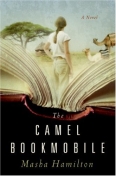BKMT READING GUIDES
The Camel Bookmobile
by Masha Hamilton
Hardcover : 320 pages
4 clubs reading this now
4 members have read this book
When Fiona Sweeney tells her family she wants to do something that matters, they do not expect her to go to Africa to help start a traveling library. But that is where Fiona chooses to make her mark: in the arid bush of northeastern Kenya, among tiny, far-flung communities, nearly ...
Introduction
When Fiona Sweeney tells her family she wants to do something that matters, they do not expect her to go to Africa to help start a traveling library. But that is where Fiona chooses to make her mark: in the arid bush of northeastern Kenya, among tiny, far-flung communities, nearly unknown and lacking roads and schools, where people live daily with drought, hunger, and disease.
In The Camel Bookmobile, Fi travels to settlements where people have never held a book in their hands. Her goal is to help bring Dr. Seuss, Homer, Tom Sawyer, and Hemingway to a largely illiterate and semi-nomadic populace. However, because the donated books are limited in number and the settlements are many, the library initiates a tough fine: if anyone fails to return a book, the bookmobile will stop coming.
Though her motives are good, Fi doesn't understand the people she seeks to help. Encumbered by her Western values, she finds herself in the midst of several struggles within the community of Mididima. There the bookmobile's presence sparks a feud between those who favor modernization and those who fear the loss of the traditional way of life in the African bush. The feud heightens when one young man—'Scar Boy'—doesn't return his books. As promised, the library stops all visits, but Fi goes to the settlement alone, determined to recover what has been lost.
Evocative, seamless, and haunting, The Camel Bookmobile is a powerful saga that challenges our fears of the unknown. It is a story that captures the riddles and calamities that often occur when two cultures collide. It follows an American librarian who travels to Africa to give meaning to her life, and ultimately loses a piece of her heart. In the end, this compelling novel shows how one life can change many, in spite of dangerous and seemingly immutable obstacles.
Excerpt
February 1989 - Mididima, North Eastern Province, KenyaScar Boy
The child, wide-legged on the ground, licked dust off his fist and tried to pretend he was tasting camel milk. Nearby, his father spoke ardently to a thorny acacia while his older brother hurled rocks at a termite mound. Neither paid him any attention, but this didn’t change the fact that for the child, the three of them existed as a single entity. It was as if he drank dust, talked to a tree and threw stones all at once. He took this inclusion, this oneness, for granted. Separate was a concept he was too young to recognize. Nor did he know of change, or fear, or the punishment of drought. All of life was still predictable, and forever, and safe. ...
Discussion Questions
From the Author:1. One of the main conflicts in the book is between the library proponents and those who fear the imposition of Western values and the loss of centuries of tradition. Can The Camel Bookmobile be seen as an allegory for what's still taking place in the world today? Is there a lesson to be learned?
2. What is gained (or lost) by the use of multiple viewpoints to tell this story? How do the various viewpoints weave together to reinforce the theme of books as instruments of change and growth?
3. Each character is changed in some way by the bookmobile. Discuss those changes. Specifically, Fi goes to Kenya convinced that she is bringing knowledge to the African bush, but in the end she learns at least as much as any other character. What are the main lessons she learns?
4. Many of the people of Mididima make it clear that they do not want to be seen as ignorant simply because they are illiterate. At the novel’s end, the traditional values seem to win out. But do you think books and modernism will continue to impact the people of Mididima, even beyond the novel’s conclusion?
Weblinks
| » |
Publisher's Book Info
|
| » |
About the Author & Book Tour Info
|
| » |
Masha Hamilton's web site
|
| » |
Reviews
|
| » |
Author Tour Schedule
|
Notes From the Author to the Bookclub
A note from Masha: My daughter first mentioned the unique bookmobile to me years earlier after reading about it in a magazine article for kids. What she said immediately triggered my imagination. This is not how novel-writing usually works for me, but in an instant, I saw Scar Boy, viciously attacked by a hyena, an outsider who turns to books for an unusual reason, and Mr. Abasi who thinks his camel is his mother reincarnated, and beautiful Jwahir with disdain for a book she mistakenly calls "A Cat on a Hat." I saw Jwahir's husband, the teacher Matani, with his commitment to the same bookmobile his wife rejects and his desire to father a son. And I saw Fi, the idealistic American who hopes to help enlighten a people of the bush — but finds that she is the one who learns the most. In fact, the camel bookmobile changes each character in unexpected ways. And Fi, in many ways, illustrates Americans abroad at their best and their worst. She demonstrates that even the best of goals, when coupled with cultural ignorance, can lead to mistakes with tragic consequences.Book Club Recommendations
Recommended to book clubs by 2 of 2 members.
Book Club HQ to over 88,000+ book clubs and ready to welcome yours.
Get free weekly updates on top club picks, book giveaways, author events and more








